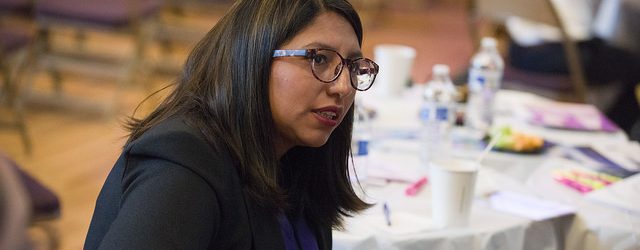As a CIPA student, you have myriad opportunities to engage in policy discussion with fellow students, professionals in the field, and academics. In this Q&A, Sandra Mosqueira, a first-year CIPA fellow, speaks about a recent forum where she was able to connect with public policy students from other universities.There, she participated in an important dialogue about the intersection of indigenous rights and environmental policy.
What is your policy concentration?
I have chosen Social Policy as my concentration. I am focusing on public services regulation due to my interest in environmental regulation. I am committed to learning how to properly approach sustainability issues within the context of government.
How did you find out about the conference? How did you apply?
As a part of the Cornell Latin American Student Society (CLASS), I receive notifications about events and conferences at other policy schools. The invitation for this conference about Amazonian deforestation came from the Harris School’s Public Policy Student Association, which encouraged us to apply. I had to send a cover letter and my CV. In my application, I explained my experience in environmental policy and indigenous rights, and their relation to extractive industries in Peru.
What kinds of things did you learn about during the conference?
My learning process was divided into two parts: the preparation of information and student engagement.
First, to prepare for this session, I had to learn about Brazil’s economic and legal structure. This was very interesting because Brazil is a diverse country, just like my native Peru. During this session we learned about the paradoxical nature of Brazil’s legal system: while Brazilian legislation has many, thorough laws which consider protection of the environment and due process, the enforcement of these laws is minimal to nonexistent. This discrepancy was highlighted in our discussions. Furthermore, I realized that the most significant problem facing indigenous rights in Brazil is not the extractive industries (as it is in Peru), but actually the management of agricultural businesses.
The second part of the learning process for me was the experience itself, working with students from different universities with different policy backgrounds over an intensive, 8-hour session. Through this experience, I learned how to keep motivating myself to create innovative solutions within my group. Working with such a dynamic team, I realized that every experience brought to the table was valuable, and that everyone had something to offer–something which was both encouraging and hopeful.
How did the experience inform your studies here at CIPA?
The theme of this conference itself was very interesting, and made me aware that I overlooked many courses regarding agriculture and indigenous rights, and has renewed my interest in learning more about indigenous rights in agribusiness industries. It seems more important to be cognizant of the consequences of each of these industries, and to learn that not all agribusinesses are bad. I am now more committed to learning more about different types of industries and understanding their impact on the environment, as well as to seek out the best approaches to reduce any negative consequences of these industries.

Photo credits: Joel Wintermantle.
Caption: Students work in a group session during the first Inter-Policy School Summit. Hosted by the Harris School, more than 30 students from top public policy schools from around the country participated. The Summit was held at the International House on the University of Chicago campus on Saturday, Mar., 4, 2017.


